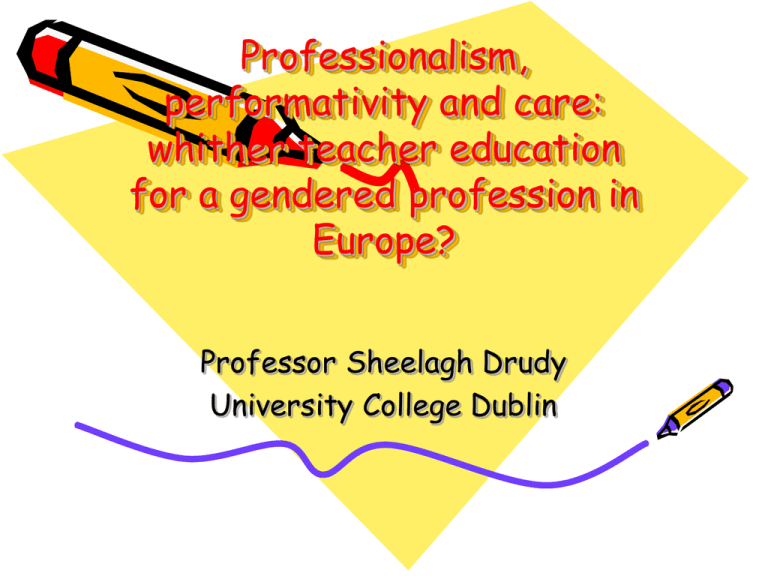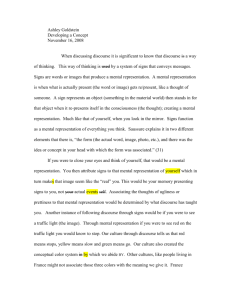Key note 3: Professionalism, performativity and care: whither teacher
advertisement

Professionalism, performativity and care: whither teacher education for a gendered profession in Europe? Professor Sheelagh Drudy University College Dublin Paper Outline • • • • • discourses on teacher education highly feminised nature of teaching changes that have happened in universities implications for teacher education current European policy on teaching and teacher education • published research evidence from EU, North America, Australasia, research in Ireland A highly gendered profession • 70%+ teachers in primary education are women • lower secondary education is not as high as in primary education • % of women in upper secondary education less striking but outnumber men in nearly all countries • policy in relation to teaching and teacher education must take account Discourses on teaching • • • • discourse of domesticity discourse of femininity discourse of care discourse of performativity and ‘new managerialism’ • discourse of professionalism Discourse of domesticity • ‘Domestic ideology’: women ‘naturally’ more disposed towards nurture than men • Women greater suitability for teaching very young children • perception of school students and student teachers that women best suited to primary teaching • most frequent explanation for the low proportion of men in primary teaching the perception that it is a ‘woman’s job’ Discourse of femininity • linked to the discourse of domestic ideology • notions of female domesticity and service linked to teacher professional identities • women teacher educators read their own working lives through images of female domesticity • discourse of femininity found in primary teacher education programmes • women teachers reproduce, rather than change, traditional gender patterns Discourse of care • care central and fundamental to human development and well-being, social solidarity, and to economic development • ‘nurturing capital’ • feminine and feminist ethic of care (Gilligan) • concept of care linked to concept of justice • ‘caring-for’ and ‘caring-about’ (Noddings) Three-fold taxonomy of care (Lynch) • Primary care relations • Secondary care relations • Tertiary care relations Discourse of care • The affective domain, or caring about children, is fundamental to teacher professional identity (Barber) • Ethic of care embedded in Codes of Professional Conduct of Teaching Council (Ireland): “As well as the legal duty of care which teachers exercise, their role as carers is central to their professional value system” Care • Understood in many different ways by teachers caring as commitment, caring as relatedness, caring as physical care, caring as expressing affection, caring as parenting and caring as mothering (Vogt) • a moral perspective • an ethic of care understood as responsibility for and relatedness to their pupils • ethic of care should be an integral element of quality in teaching and in teacher education Care • Orientation to social justice • Altruistic values, making a difference • Irish research - male and female student teachers were more strongly oriented to caring or altruistic values than were second-level pupils • Male student primary teachers markedly different from other males in relation to their attitudes to caring/altruistic values • Ethic of care should be an integral element of quality in teaching and in teacher education Discourse of performativity and ‘new managerialism’ • Neo-liberalism • Audit culture • Removal of locus of power from practicing professionals to auditors • Surveillance • New? - “payment by results” 19th C. Irl • Research on negative aspects of performative pressures in teaching Discourse of professionalism • Managerial and democratic professionalism (Sachs) • Managerial discourse dominant • Associated with neo-liberalism • Involves re-organising the public sector according to ‘best’ commercial practice • Involves ‘masculinising’ school cultures Discourse of professionalism Democratic professionalism: • Emerges from the profession itself • Relies on trust rather than performance ranking • Emphasis on collaborative, cooperative action between teachers and other educational stakeholders Teacher Education, Universities and Performativity Cultures • Teacher education mainly located within universities in Europe • Rise of the ‘entrepreneurial’ university • Development of performativity, managerialism and audit cultures • Advantages to states of performativity cultures in higher education • Research on problems emerging • Tensions between cultures of teacher education and performativity cultures Teacher Education in Changing Environments • Role of universities in the deepening of democracy, the fostering of social justice and the public good • Teacher education, educational sciences, educational research a very important element of university’s role • Role of teachers in daily lives of entire populations • Importance of higher education in initial and continuing education (Commission of EU) Teacher Education in Changing Environments • Impact of research on policy agenda • Importance of retaining teacher education in universities/higher education • Space to develop reflective and critical practitioners • Harvest potential of research-based, problem-centred teacher education International Policy on Teaching and Teacher Education • Lisbon, Bologna, Bergen implications • Commission of EU – common principles, statement to parliament: • Teaching: high status, high reward, well-qualified profession with opportunity to continue studies to highest level • Teachers: lifelong learners who understand social cohesion and exclusion in society and ethical dimensions of the knowledge society; reflective, analytical and critical practitioners • Teacher education: an object of research International Policy on Teaching and Teacher Education • OECD – Teachers Matter • Economic competitiveness and efficiency, high quality in teaching • Enhance the status of teaching • Language: performativity, performance indicators, standards, evaluation and appraisal • “concern” at decline of males in the profession, based on supposed benefits of male role models and decline in appeal of teaching Conclusions • Teaching highly feminised in Europe • Disjunction between performativity discourse and discourses integral to teaching, such as an ethic of care • Universities now imbued with performativity cultures yet retaining university involvement in teacher education is fundamental to professional status • Need to align professional agendas with EU policy • Need to add an ethic of care, social justice and solidarity to teacher education policy in Europe








